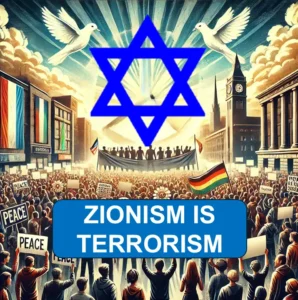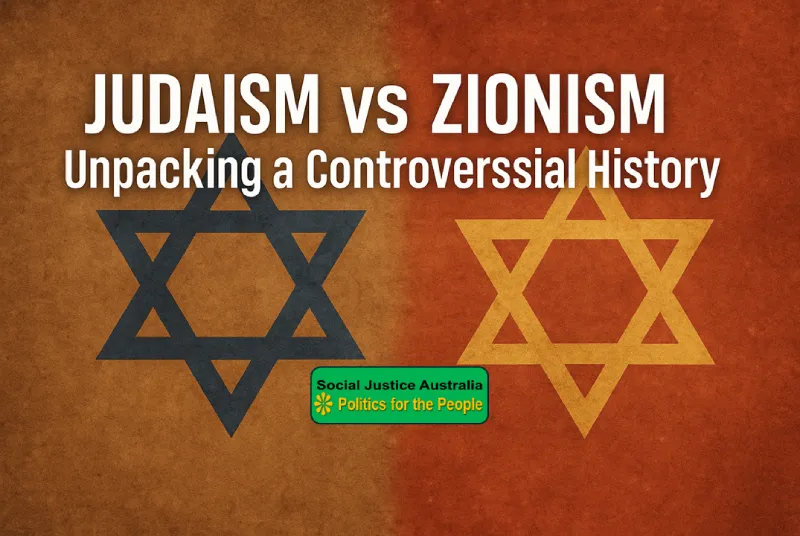Description
Judaism vs Zionism. Explore the stark differences between Judaism and Zionism and learn how politics, history, and ideology have distorted public understanding.
Introduction
Picture this: A peaceful Shabbat dinner in a Melbourne Jewish household. The grandmother shares stories of her European ancestry, tales of Torah wisdom, and the trauma of fleeing Nazism. Her grandson, however, is unsure whether to identify as simply Jewish or as a Zionist because all around him, media and politicians speak as if the two are the same.
This confusion isn’t accidental. The conflation of Judaism and Zionism is a powerful political tool, but it comes at a significant cost: truth, justice, and the very essence of Jewish identity.
This article explores the ongoing debate of Judaism vs Zionism, unpacking the distinctions, history, and global consequences.
Judaism vs Zionism: A Spiritual Tradition vs Political Ideology
Judaism is over 3,000 years old, rooted in spiritual teachings, ethical values, and a profound connection to community and justice. It’s a religion, a philosophy, and a cultural identity, not a political ideology.
Judaism as a Religion
• Monotheistic, centred around the Torah.
• Focused on spiritual reflection, community, and ethics.
• Values include tikkun olam (repairing the world) and social justice.
Jewish Diversity
• Ashkenazi, Sephardi, Mizrahi, Ethiopian Jews and more.
• Not all Jews are religious; many are cultural, secular, or spiritual.
• Countless Jews have never identified with Zionism, especially historically.
Diaspora Identity
• The majority of Jews have lived outside their ancestral homeland for millennia.
• Judaism thrived without a nation-state, emphasising adaptability and resilience.
Zionism: From Ideological Dream to State Power
Zionism appeared in the late 19th century during intense antisemitism in Europe. For many Jews who were being violently attacked and persecuted, the idea of creating a Jewish homeland seemed like a way to find safety and freedom.
The ideological evolution traced here shows how Judaism vs Zionism reflects a shift from spiritual resilience to political nationalism.
Origins of Zionism
• Theodor Herzl, considered the father of modern political Zionism, envisioned a secular Jewish state as a safe haven.
• In his 1896 book Der Judenstaat, Herzl argued that Jews would never be safe in Europe and must have a state of their own.
• Early Zionists were predominantly secular Ashkenazi Jews who saw statehood as the path to normalising Jewish existence.
Motivations and Internal Conflicts
• While some Zionists focused on spiritual or cultural revival, others prioritised political sovereignty.
• There was conflict between those who wanted to revive Hebrew as a spoken language and those who preferred Yiddish or other diaspora languages.
• Tensions also existed between Zionist settlers and long-established Jewish communities in Palestine, who did not support the political Zionist agenda.
Expansion and Settlement
• From the early 1900s through World War I, Zionist organisations helped Jewish immigration (Aliyah) to Palestine, then under Ottoman control.
• Following the Balfour Declaration (1917), which supported a Jewish national home in Palestine, Zionist activities increased significantly under British Mandate rule.
• Institutions like the Jewish National Fund and the Histadrut (Jewish labour federation) helped acquire land and build infrastructure exclusively for Jewish settlers, often at the expense of Palestinian Arab communities.
Path to Statehood
• By the end of World War II, support for a Jewish state grew, driven by sympathy for Holocaust survivors.
• In 1948, the State of Israel was declared. The event was a triumph for Zionists but a catastrophe (Nakba) for Palestinians, with over 700,000 displaced.
• The founding of Israel was accompanied by ethnic cleansing, martial law over Arab citizens, and a growing militarised nationalism.
Zionism had evolved from a political movement into a state apparatus, tightly bound to militarism, land acquisition, and religious justification, despite its secular origins.
Opposition to Zionism Within Judaism
One of the most essential distinctions in the Judaism vs Zionism debate lies in how Jewish communities, both religious and secular, have historically resisted the conflation of their faith with a nationalist project.
Opposition to Zionism has been a consistent, if marginalised, current within Jewish thought, spanning religious and secular spectrums. Many Jews believe Zionism distorts Judaism’s spiritual mission and universal ethics.
Jewish Religious Opposition
• Ultra-Orthodox Jewish groups like Neturei Karta and factions of Satmar Hasidim view Zionism as a rebellion against divine will.
• Their belief: Jews were exiled from Israel as a spiritual consequence and must not return until the coming of the Messiah.
• They argue the creation of a secular Jewish state before divine redemption is both a sin and a source of endless violence.
Quote: Rabbi Yosef Blau (Yeshiva University): “Zionism is not Judaism. It is a political ideology… and often conflicts with Torah values.”
Reference: Jewish Voice for Peace
Secular Jewish Critique
• Leading intellectuals like Albert Einstein refused offers to become President of Israel, warning of nationalism’s dangers.
• Philosopher Hannah Arendt warned that Zionism would lead to an apartheid state and perpetual conflict with Arabs.
• Noam Chomsky and other Jewish scholars have critiqued Israeli policies as imperialist and unethical.
Example: In 1948, 18 prominent American Jews—including Hannah Arendt and Rabbi Elmer Berger—signed a public letter opposing Menachem Begin’s visit to the U.S., calling his party “closely akin in its organisation, methods, political philosophy, and social appeal to the Nazi and Fascist parties.” (New York Times, 1948)
Contemporary Jewish Anti-Zionist Movements
• Groups like Jewish Voice for Peace, IfNotNow, and Independent Australian Jewish Voices oppose Israel’s apartheid practices and support Palestinian rights.
• These groups advocate for decolonisation, human rights, and redefining Jewish identity around justice, not nationalism.
Despite their marginalisation in the mainstream media, these voices are growing louder, especially among younger Jews who see Zionism as incompatible with global justice movements.
Zionist Collaboration with Nazi Germany: An Uncomfortable History
The Haavara Agreement (1933)
• Zionist leaders negotiated with Nazi Germany to transfer Jewish wealth to Palestine in exchange for Jewish emigration.
• Created tensions within Jewish communities, especially those focused on anti-Nazi resistance.
• Source: Edwin Black, The Transfer Agreement.
Zionist Prioritisation of State-Building Over Rescue
• Some Zionist leaders focused more on populating Palestine than rescuing Jews elsewhere.
• Stern Gang (Lehi) even attempted negotiations with the Axis powers to fight the British.
Historical Repercussions
• Survivors and Jewish historians have since grappled with these decisions.
• The reality: Zionism’s urgency led to morally ambiguous decisions.
Why Politicians and Media Strongly Support Zionism
1. Pro-Israel Lobbying
• AIJAC (Australia/Israel & Jewish Affairs Council) funds MP trips to Israel
• Lobbying influences foreign policy and stifles criticism
• Source: Crikey, MPs had accepted pro-Israel sponsored travel.
2. Media Framing and Ownership
• News Corp and other outlets frame Israel as a Western ally under threat.
• Dissenting journalists are often punished.
• Example: ABC’s Antoinette Lattouf suspended after sharing pro-Palestinian posts (The Guardian, 2023).
3. Fear of Being Labelled Antisemitic
• The IHRA definition blurs the line between antisemitism and anti-Zionism.
• Politicians self-censor to avoid controversy.
• Example: MP Josh Wilson retracted comments critical of Israel under pressure (Crikey, 2022).
4. Western Geopolitical Alignment
• Israel is viewed as a strategic Western outpost in the Middle East.
• Pine Gap and intelligence cooperation tie Australia to U.S.-Israel strategy (ABC Four Corners, 2017).
Why Judaism vs Zionism Matters: Truth, Justice, and Human Dignity
The equation of Judaism with Zionism harms both Jews and Palestinians. It erases the diversity of Jewish identity, marginalises Jewish dissent, and legitimises apartheid-like conditions in the occupied Palestinian territories. Understanding the distinction in the debate around Judaism vs Zionism is essential to restoring historical truth, promoting justice, and challenging dominant narratives that conflate religion with political ideology.
Judaism teaches justice, not nationalism. To defend the rights of all—Jews and Palestinians alike—we must tell the truth about the past and present.
Summary: Judaism vs Zionism

• Judaism is a rich, diverse religion and culture, not tied to nationalism.
• Zionism is a political ideology with a contentious and sometimes dark history.
• Jewish voices opposing Zionism have always existed.
• Politicians and media support Zionism due to lobbying, geopolitical alignment, and fear.
The debate over Judaism vs Zionism is not only political but deeply personal, affecting how Jews and non-Jews understand identity, justice, and history.
Q&A Section
Q1: Is opposing Zionism the same as antisemitism?
A: No. Many Jews, including rabbis and Holocaust survivors, oppose Zionism. Antisemitism is hatred of Jews; Zionism is a political ideology.
Q2: Why is this history not widely known?
A: Political, media, and educational institutions are vested in suppressing uncomfortable truths. Speaking up is essential to correcting this.
Q3: What does the Judaism vs Zionism debate really mean?
A: The Judaism vs Zionism debate refers to the crucial distinction between a religion rooted in spiritual teachings and ethics, and a modern political movement focused on nation-state creation. Understanding this difference helps challenge harmful conflations and promotes a more accurate, inclusive discourse.
Q4: What role can Australians play?
A: Australians can support independent media, challenge biased narratives, and pressure politicians to promote human rights over geopolitical loyalty.
Have Your Say
Have you encountered confusion between Jewish identity and political Zionism? Share your experiences or insights in the comments below.
Call to Action
If you found this article insightful, explore more about political reform and Australia’s monetary sovereignty at Social Justice Australia:
👉 https://socialjusticeaustralia.com.au/
Click on our “Reader Feedback” menu. Please let us know how our content has inspired you:
👉 https://socialjusticeaustralia.com.au/reader-feedback/
Support Social Justice Australia – Help Keep This Platform Running
https://socialjusticeaustralia.com.au/donation/
Every contribution helps keep our site independent, ad-free, and justice-focused.


The great tragedy of the establishment of Israel is that the beautiful history of Palestine has not only been ignored but almost totally erased in western history and contemporary media.
Zionists cannot bare to acknowledge the fact that Jerusalem was once peaceful and harmonious where all the Abrahamic faiths co-existed and respected each other’s faith and customs. Arab jews and muslims had community connections and cooperation in the administration of Jerusalem.
The same can be said of the rest of Palestine.
This truth hurts the Zionist untruth of Palestine never having existed and that somehow, there was never and indigenous arab population for millennia.
Absolutely, Chris, you’ve captured a powerful and often buried truth. The rich, multi-faith history of Palestine, especially Jerusalem, is something we rarely hear about in the Western media. It’s tragic that narratives of peaceful coexistence between Arab Jews, Muslims, and Christians have been overshadowed by political agendas that deny Palestine’s deep roots and cultural legacy.
The erasure of Palestinian history serves the myth that the land was “empty” before 1948 — a claim that doesn’t stand up to historical evidence. Acknowledging this doesn’t deny Jewish history; it simply affirms the whole truth, which includes centuries of shared life in Palestine.
Thanks for highlighting this — we need more conversations that reclaim and honour the lived realities of all who called that land home.